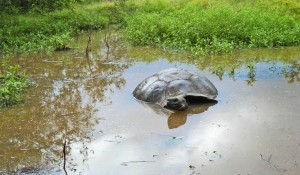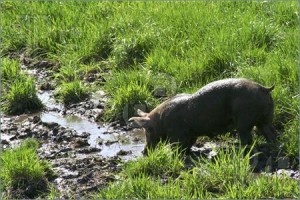Ọ̀rọ̀ Yorùbá ni “Àlébù ki ṣe ẹ̀gàn tàbi agọ̀; ṣùgbọ́n, ẹ̀gàn àti agọ̀ ni fún ẹni ti ojú rẹ fọ́ si àlébù ara rẹ”. Irú ẹni bẹ̃, kò lè ri àtúnṣe tàbi sọ àlèbú yi di ohun ini. Ninú ìtàn bi Àjàpá ti sọ Ẹlẹ́dẹ̀ di ọ̀bùn ti a mọ̀ si titi di oni, Àjàpá jẹ́ ẹranko ti kò lè yára rin tàbi ni agbára iṣẹ́ àti ṣe lówó, ṣùgbọ́n ó ni ọgbọ́n lati bo àlébù rẹ.
Yorùbá ni “Alágbára má mèrò; baba ọ̀le; Ọgbọ́n ju agbára”. Àjàpá́ jẹ́ ọlọ́gbọ́n ẹwẹ, nigbati Ẹlẹ́dẹ̀ jẹ́ alágbá̀ra ti kò mèrò. Kò si ohun ti Àjàpá lè ṣe lai ni idi tàbi ọgbọ́n àrékérekè, nitori eyi, ó sọ ara rẹ di ọ̀rẹ́ Ẹlẹ́dẹ̀ nitori gbogbo ẹranko yoku ti já ọgbọ́n rẹ. Ẹlẹ́dẹ̀ kò fi ọgbọ́n wá idi irú ọ̀rẹ́ ti Àjàpá jẹ́. Laipẹ, Àjàpá lọ yá owó lọ́dọ̀ Ẹlẹ́dẹ̀ pẹ̀lu àdéhùn pe ohun yio san owó na padà ni ọjọ́ ti ohun dá. Ẹlẹ́dẹ̀ rò pé ọ̀rẹ́ ju owó lọ, ó gbà lati yá Àjàpá lówó nitori àdéhùn rẹ.
Nigbati ọjọ ti Àjàpá dá pé, Ẹlẹ́dẹ̀ reti titi ki ó wá san owó ti ó yá, ṣù̀gbọn Àjàpá kò kúrò ni ilé rẹ nitori ó mọ̀ pé ohun kò ni owó́ lati san. Àjàpá fi ohun pẹ̀lẹ́ ṣe àlàyé pé bi ohun ti fẹ́ ma kó owó lọ fún Ẹlẹ́dẹ̀ ni olè dá ohun lọ́nà, ti wọn gba gbogbo owó lọ. Inú Ẹlẹ́dẹ̀ kò dùn nitori kò gba iṣẹ̀lẹ̀ yi gbọ́, ṣùgbọ́n ó gba nigbati Àjàpá tún dá ọjọ́ miran lati san owó na. Bi Ẹlẹ́dẹ̀ ti kúrò ló bá aya rẹ “Yáníbo” dìmọ̀pọ̀ bi ohun kò ti ni san owó padà. Ó ni bi ọjọ́ bá pé, bi Yáníbo bá ti gbọ́ ìró Ẹlẹ́dẹ̀, kó yi ohun padà, ki ó bẹrẹ si lọ ẹ̀gúsí ni àyà ohun lai dúró bi Ẹlẹ́dẹ̀ bá wọlé bèrè ohun.

Àjàpa ninu ẹrọ̀fọ̀ ti Ẹlẹ́dẹ̀ ju si – The Tortoise thrown by the Pig into the swamp. Courtesy: @theyorubablog
Ni ọjọ́ ti Àjàpá dá pé, Ẹlẹ́dẹ̀ dé lati gba owó rẹ, Yáníbo ṣe bi ọkọ rẹ ti wi. Ẹlẹ́dẹ̀ fi ibinu gbé ọlọ àti ẹ̀gúsí sọnù si ẹrọ̀fọ̀ ti ó wá ni ìtòsí lai mọ̀ pé Àjàpá ni ọlọ yi. Yáníbo fi igbe ta titi ọkọ rẹ fi wọlé. Àjàpá yọ ara rẹ̀ kúrò ninú ẹrọ̀fọ̀, ó nu ara rẹ̀, ó ṣe bi ẹni pé ohun kò ri Ẹlẹ́dẹ̀ nigbati ó délé. Ó bèrè ohun ti ó fa igbe ti Yáníbo ńké. Yáníbo ṣe àlàyé.
Yorùbá ni “Ọ̀bùn ri ikú ọkọ tìrọ̀ mọ́, ó ni ọjọ́ ti ọkọ ohun ti kú ohun ò wẹ̀”. Àjàpá ri ohun ṣe àwá-wi, ó sọ fún Ẹlẹ́dẹ̀ pé ọlọ ti ó gbé sọnù ṣe pataki fún idilé àwọn, nitori na ó ni lati wá ọlọ yi jade ki ohun tó lè san owó ti ohun yá. Ẹlẹ́dẹ̀ wọnú ẹrọ̀fọ̀ lati wá ọlọ idile Àjàpá. Lati igbà yi ni Ẹlẹ́dẹ̀ ti bẹ̀rẹ̀ si fi imú tú ẹrọ̀fọ̀ titi di ọjọ́ oni.
ENGLISH TRANSLATION
According to Yoruba adage “Deficiencies are no cause for shame or embarrassment; but it is for those who are blind to their deficiencies”. Such people are incapable of compensating or converting such deficiencies to assets. In the folktale about “How the Tortoise turned the Pig to the Filthy One – the image that has stuck till date”, the Tortoise was known as a very slow animal nor the energy to labour to earn a living, but the wisdom to cover his deficiencies.
Yoruba Proverb said, “One who has strength but is thoughtless is the father figure of laziness –wisdom is mightier than strength”. In this context, the Tortoise was the crafty one while the Pig was the strong one without wisdom. The Tortoise would not do anything for nothing hence, he made friend with the Pig, having realised that all the other animals were aware of his all his tricks. The Pig on the other hand did investigate the kind of friend the Tortoise was. In no distance time, the Tortoise went to beg for a loan from the Pig with a promise to pay on an appointed date. The Pig entrusted him as a friend giving him priority over money hence the Pig released the loan to the Tortoise based on his promise.
When the loan payment date was due, the Pig waited endlessly for the Tortoise to repay the loan, but the Tortoise did not leave his home because he knew he had no money to pay. On seeing the Pig at his home, he began to explain how he was waylaid by the thieves on his way to repay and all the money was taken. Though the Pig was unhappy with his story, he agreed but because he had given another payment day. As the Pig left, Tortoise began to plan with his wife “Yanibo” on how to avoid payment on the next due date. He instructed that once the wife noted that the Pig’s arriving, she should turn him to a grindstone and began to grind melon seed on his chest without minding his arrival. As soon as Yanibo heard the Pig was on his way, she did according to her husband’s instruction. In anger, the Pig flung both the grindstone and the melon seed to the swamp. Yanibo began to wail about her grindstone till her husband arrived. On the Tortoise arrival, ignoring the Pig’s presence, he enquired why his wife was wailing and she explained.
Yoruba Proverb said, “The filthy person takes advantage of her husband’s for blame; she says since her husband died she has not taken her birth”. The Tortoise had an excuse to latch on to the fact that the grindstone was so precious to the family hence the Pig had to fetch it from the swamp before he could get his money back. The Pig went in search of the Tortoise family grindstone in the swamp. Ever since then, the Pig had continued to rout the swamp with his nose.
Originally posted 2014-02-18 23:03:39. Republished by Blog Post Promoter



